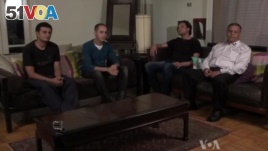December 05,2013
CAIRO — In Egypt, key points of difference often revolve around religion: did the rule of Islamist President Mohamed Morsi threaten to radicalize the deeply conservative country? Will minority Christians find the protection they have so long sought? These central questions often leave little room for those who have no religious beliefs. As Egypt undergoes profound change, atheists are trying to be heard, arguing tolerance could be a true test of Egyptian modernity.
Across Egypt, from the call to prayer sounding from the mosques five times a day, to the sermons of Christian churches, religion permeates daily life.
For most, it is a faith that must be never broken.

Recently, four men who believe in neither Islam or Christianity - or indeed any religion - met to discuss the difficulties of being atheist in Egypt. They are well aware of the dangers, but they want to speak out - not against religion, but for their right to not have one.
Ahmed Hussein, from a strict Salafi Muslim family, began to have religious doubts as a teen. He told others only in recent years.
Hussein describes how his mother simply collapsed at the news. His sheikh sent him to a psychiatrist, who said he was not insane - just an atheist. His sheikh rejected the diagnosis.
Hussein describes how his sheikh insisted that he suffered the “sickness of doubt.” He believes his sheikh made that up to protect him from the death sentence apostasy can be. The state does not criminalize atheism as such, but its law against “insults to religion” often amounts to the same thing.
The jailing of online atheists led Ismail Mohamed, at the time a moderate Muslim, to explore the subject. He knew little about atheism but the arrests seemed to him unfair.
Mohamed said online research was the first spark to understanding of not just atheism, but science as well. In school, he said, evolution was mentioned, but only to serve religious principles.
For the other two in the group, Milad Soliman and Ayman Nakhla, both former Christians, questions also led to exploration. The Internet opened a new world, bringing together people - their exact numbers unknown - who thought they were alone.
A few days after speaking with VOA, Ismail Mohamed went further - appearing on Egyptian television.
He was pilloried by the host and call-in guests, but his very appearance was a breakthrough. Political analyst and long-time rights advocate Hisham Kassem couldn’t believe his eyes.
“This man, young man, was sitting there confidently making his case. I was sitting there amazed. I never thought I will see this in my lifetime,” said Kassem.
However, there are many hurdles still to be overcome. Ayman Nakhla was among a group of atheists calling for the new draft constitution to be secular - a request rejected out of hand. Political sociologist Said Sadek of the American University in Cairo expects a greater divide between religion and the state in the future, but perhaps not now.
“You need to have the separation of the state and the church [religion], But it needs a lot of education and a lot of enlightenment and I think it is happening already,” said Naklha.
The former Salafist Hussein agrees, and predicts that Egypt's younger generation is already more open to the idea because of their willingness to talk with one another openly, both in person and online.
But even as these four men try to help educate others on the universal right to freedom of thought and belief, their fellow atheists continue to be jailed.